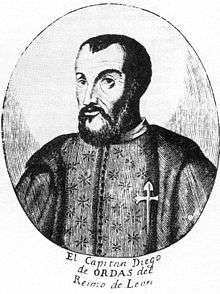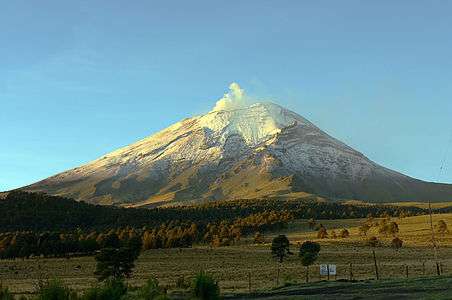Diego de Ordaz

Diego de Ordaz (also Diego de Ordás; 1480 in Castroverde de Campos, Zamora province, Spain – 1532 in Venezuela) was a Spanish explorer and soldier.
Early career
Diego de Ordaz arrived in Cuba at a young age. Serving under the orders of Diego Velázquez, he participated in the earliest exploratory expeditions to Colombia and Panamá.
Expedition of Cortés to Mexico
De Ordaz accompanied Hernán Cortés on his expedition of conquest to the Mexican mainland.[1]:48,221 He was recognized for his contribution to the victory over the Aztecs obtained at the Battle of Centla near Río Grijalva in Tabasco on March 25, 1519.
Together with two comrades, he was the first European to climb to the top of the volcano Popocatépetl - a feat which made a great impression on the indigenous allies accompanying Cortės. In recognition of De Ordaz's military deeds, the emperor Charles V on October 22, 1525 issued a decree permitting him to use a coat-of-arms featuring a view of the volcano.[1]:182–183
De Ordaz participated in the Spanish conquest of Tenochtitlán, the Aztec capital. When prior to the final conquest, the Spaniards were forced to flee from the capital in a nocturnal action known as La Noche Triste ("the sad night"), De Ordaz was wounded.
Following the conquest of Mexico, De Ordaz explored the areas of Oaxaca and Veracruz, and navigated the Río Coatzacoalos.
In 1521, he was sent back to Spain in order to present the story of the conquest of Mexico to the Spanish court, and in order to obtain for Cortės the title of Governor and General Captain of New Spain
Search for El Dorado
De Ordaz returned to North America in approximately 1525. In 1529, he was granted the property of El Peñón de los Baños located within the limits of Mexico City.
He returned again to Spain and requested permission to explore the lands of the mythical El Dorado, which was believed to lie inland in the area of what is now Venezuela. Having obtained the sought permission, he sailed for South America, exploring up the Río Orinoco. After abandoned the search for El Dorado, he died in 1532 on the Venezuelan Paria Peninsula, just before sailing back to Spain.
Legacy
In 1952, a planned city called Puerto Ordaz was founded in Venezuela on the banks of the Orinoco River; today it is one of that country's principal cities.
Diego de Ordaz was one of the principal characters in the anonymous historical novel Jicoténcal published in Philadelphia in 1826 and attributed to several different writers like Felix Varela, José María Heredia, and Félix Mejía.
